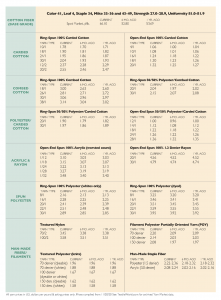 By Jim Phillips, Yarn Market Editor
By Jim Phillips, Yarn Market Editor
The impact of COVID-19 is the lead story in 2020 for the U.S. yarn and textile industries. A review of the year to date reveals a January brimming with optimism, a March veiled in uncertainty, and an April and beyond doubt and worry.
For example, an excerpt from the January-February 2020 Yarn Market reveals anticipation for solid business growth: “As the post-holiday retail inventory adjustment comes to a close, spinners are once again reporting an increase in orders. ‘It’s the same cycle every year — at least in good years,’ said one spinner. ’We go full-out to meet holiday orders and then we have a lull in the fourth quarter and the beginning of the first quarter. Then, a few weeks into the first quarter, we start seeing business trickle in again.’ Added another spinner: ‘I would not say it’s booming, but it is definitely picking up across the board. Cottons, blends, home furnishings, they are all beginning to tick upward.’”
Fast-forward to March: “‘Right now, it’s just wait and see,’ said one industry expert. ‘With retailers like Abercrombie, Levi’s and Nordstrom closing at least through the end of March, we expect to see a general slowdown in orders across the entire supply chain. How deeply it will affect individual companies — and the industry as a whole — will depend on how long the epidemic lasts.’
‘What we are really concerned about, from a business perspective, is how long this is going to last,’ said one executive. ‘If it lasts long enough to affect back-to-school and holiday orders, it could turn into a bad year for the industry as whole.’”
Those last words were prophetic. According to OTEXA, COVID-19 resulted in an approximate 22 percent drop in the value of U.S. textile output in the second quarter. By the end of July, the value of U.S. yarn exports went down 31 percent year over year. By mid-year, overall employment in the U.S. textile and apparel industry was down by some 80,000. As the year winds down, many of these workers are still unemployed, with diminishing unemployment benefits and little-to-no health insurance. The unemployment and insurance disaster has been further exacerbated by a U.S. President that, according to numerous sources, has essentially “checked out” since losing the election. With little help anticipated from Washington over the next few months, the outlook for some of these displaced workers is grim, according to health officials and economists.
Some companies were able to at least somewhat offset the loss of regular business by manufacturing personal protective equipment (PPE) for front-line health workers.
For example, Unifi, supplied yarns and fibers to more than 100 companies that produced masks, gowns, and other PPE needed by first responders, medical personnel and the military. Unifi’s fiber is an essential ingredient in the production of hundreds of critical components and products, including masks, gowns, sewing thread for gowns, sterile wipes, drapes, and elastics for masks and face shields.
One Unifi customer, Contempora Fabrics, based in Lumberton, N.C., shifted from the production of baseball uniforms to making medical masks and gowns. And S.C.-based Phenix Engineered Textiles used Unifi fiber and yarn to make elastic trapping for face masks.
As the year ends with news of multiple vaccines with more than 95 percent efficacy that should be available beginning in Q1, the hope is that 2021 will see a return to some semblance of normalcy. The next Yarn Market will take a look at what spinners see in the crystal ball for 2021.
Traceability update
In the October 2020 Yarn Market report, the primary topic was the emergence of supply-chain traceability as a critical factor in the production of fiber, yarn, and fabric.
With increasing instances of counterfeiting, product contaminations and incomplete or inaccurate labeling, immutable traceability can help restore consumer confidence and ensure product safety by tracking every product development from initiation to end use. For example, for a cotton yarn, fabric makers will be able to see every detail of the yarn’s life cycle, from the moment the seed was planted until the yarn arrives at the weaver or knitter. Consumers will be assured of getting an authentic product with an accurate label.
Lenzing Uses Blockchain For Traceability
Shortly after last month’s column was published, Austria’s Lenzing became the latest to announce a large-scale traceability program. “To date, supply-chain traceability has become a top priority for apparel and home brands,” Lenzing stated in a news release. “To address both consumer demand and compliance risks increasingly faced by brand partners, Lenzing is introducing a brand-new blockchain-enabled supply chain traceability platform powered by TextileGenesis™.”
For those unfamiliar with the term, blockchain in a decentralized distributed ledger technology originally created for recording cryptocurrency transactions, such as those with Bitcoin. It uses blocks of information on many different computers to create an almost tamper-proof record of actions and transactions, as well as a complete and accurate chain-of-custody record.
According to the news release, the platform went live on November 5 and will be phased in incrementally. It will be accessible for all brands using Tencel™ and Lenzing™ Ecovero™-branded fibers, as well as for all supply chain partners globally across Asia, Europe and the Americas.” In the United States, Lenzing operates a Tencel fiber plant in Axis, Ala.
One of the core components of the platform powered by TextileGenesis is integration with the Lenzing E- Branding fabric certification system, which allows brands and retailers not only to access the full supply chain traceability for Tencel and Lenzing EcoVero branded fibers but also to view the results of forensic (physical) verification of fabric samples via the digitally signed Lenzing E-Branding fabric certificates.
“Over the past year, during the pilot program and field trials we have been receiving very positive feedback from brands and supply chain partners,” said Robert van de Kerkhof, chief commercial officer and member of the board at Lenzing. “Our brand partners have also been encouraging us to accelerate the global roll-out for traceability of Lenzing fibers. With this new system and the integration with Lenzing E-Branding fabric certificates, the entire Lenzing ecosystem will create an unprecedented level of transparency. This will provide consumers with the most sustainable and climate-friendly clothing and home textile products that are made of Tencel or Lenzing EcoVero branded fibers.”
November 2020





